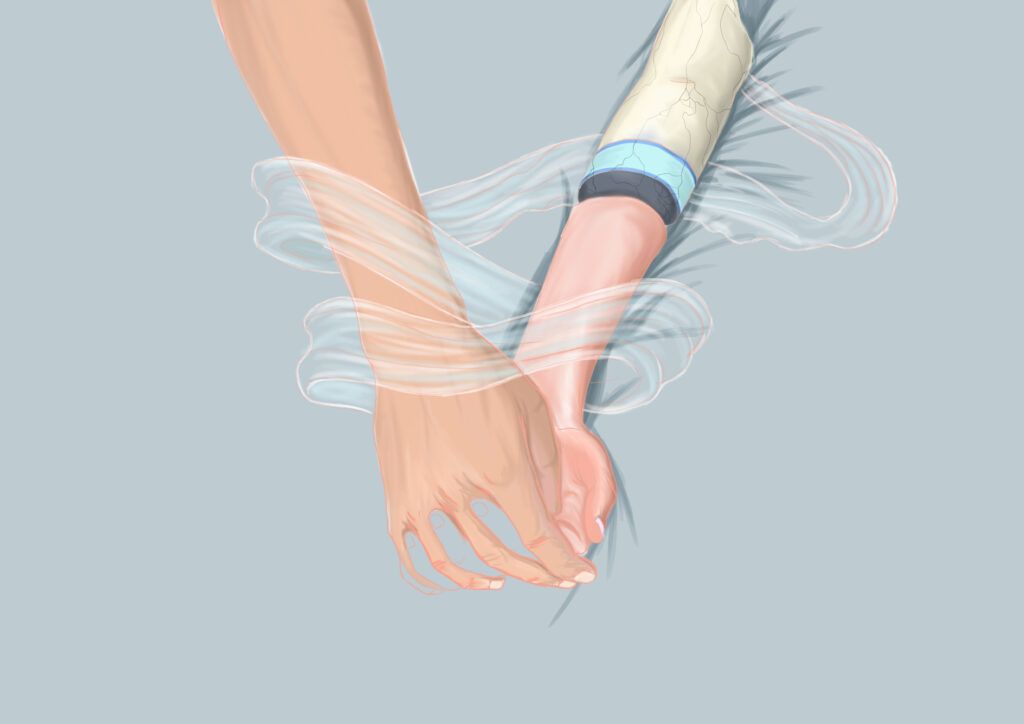
I was a little tired, but she deliberately came closer to me. I brushed her body aside and began mechanically searching for thoughts that could arouse me, but most of them were dull. So I had to rely on monotonous, repetitive movements, trying to retrieve a long-lost pleasure. Her skin was very dry, which inexplicably irritated me, causing those mechanical actions and the vague path toward pleasure to overlap at certain points. I was eager to find the right answer, as if solving a problem repeatedly, believing that enough attempts could eventually derive a solution.
Suddenly, I felt I couldn’t leave her. I knew this mindless operation—just following specific steps—had finally brought that leap from quantity to quality. I reached that peak, pulled her toward me with all my strength, trying to press us closer, closer still. The familiar sensation came quickly, but the warmth soon became an unnecessary heat. I knew what would happen next, I knew the coming touches, the breathing, the pauses. And yet I repeated it all, again and again, until the sensation was entirely spent. In the end, it was just this. Nothing more.
In that moment, I realized she no longer needed to be this close. Her soft breathing through her nose and the heat from her body began to irritate me. So I pushed her away. I was truly exhausted.
I wanted to look at her, praise her. Compared to her younger photos, I preferred her now—worn down, damaged. But when I saw her laugh, teased by me, mouth stretched wide, head swaying gently, I couldn’t discern her features from the twisted lines pressed out from the corners of her eyes and the center of her forehead. I couldn’t extract the elements that once stirred my interest. So I turned off the light in silence.
Later, I saw her again, on the autopsy table. They lifted the towel and asked if it was her. I didn’t answer. When everyone had left, I stayed alone with her. I uncovered what was laid over her body. She had already been cut open—her chest lifted, her body soaked in formalin. Her skin was wet but looked entirely dry, clinging to the muscles in deep hollows. Some areas had begun to blacken. Her hair was bleached and brittle. Her mouth hung open from the shrinkage of her skin, revealing pale yellow, delicate, small teeth. I looked at those parts of her that once moved so energetically; now they drooped, shriveled. It felt strange. I had never looked at her this way before. She rarely spoke, but she responded with a warm body. Now she was telling me something, fully, with nothing held back—but would no longer answer my questions. Everything had already been said.
I was struck—stunned. This body, I thought, must have gone through an enormous expenditure to end up this thin. Any further mechanical motion was unnecessary—for her, and for me.
I no longer had those guilty, childish thoughts. Those motions, those repetitions, those spent and re-spent routines left no trace. All that had been given, all that had been taken, ended here.
I saw clearly now. This—was just so.
I went to find her. I walked in the opposite direction, convinced, stubbornly, that she would somehow be waiting where I was about to go, silently knowing. I didn’t really believe it myself.
Today, I didn’t spare my feet. Unlike usual, I wasn’t worried about the ache that would come tomorrow. There would be no tomorrow. I walked down that long street with the intention of destroying my feet, to destroy everything about myself. Let me disappear, unconsciously, instantly—so I thought.
The snow had just melted. It was the coldest time. I wore no hat, no scarf. My skin stiffened in the air as I walked straight into the wind. The wind thought it could bring some kind of pain, but it wasn’t enough—not deep enough to wrap the pain buried in the deepest layer of my skin. When I had headaches, I would always bang my head against the wall. A different pain could distract me from the first. I hoped the wind might serve the same purpose.
I walked stupidly. Suddenly I remembered how she once placed her hand on top of mine and smiled wide at a red traffic light. That image made me stop. The next second, I remembered—it was no longer possible. That open-mouthed smile tightened, muscles stiffened as if forming a crying expression. A car brushed the hem of my skirt as it passed. My crying was strange—my eyes were dry, but my muscles had already tensed to the point of tears. I followed the script I had written for myself: was I supposed to cry now?
I saw that familiar road, the house. I went in. The door was unlocked. I sat in the spot she often sat, and by rough estimation, sat there for three hours.
Soon, I began to feel uneasy. I knew she wouldn’t appear, but I still got up and moved around, putting on the pretense of waiting. I stayed with the traces we had left behind. I stared at the wall. Outside, the lights had gone out. The sounds had gone quiet. I just sat there, alone, waiting. At first, I heard something near the door—was it her? Each time I knew it was a delusion, but my anticipation never lessened.
When the bottle was empty, I finally decided to finish it. I raised it straight up. Its last drop of life slid into my mouth.
And then?
Nothing.
She didn’t come. I wasn’t drunk.
I just sat there.
